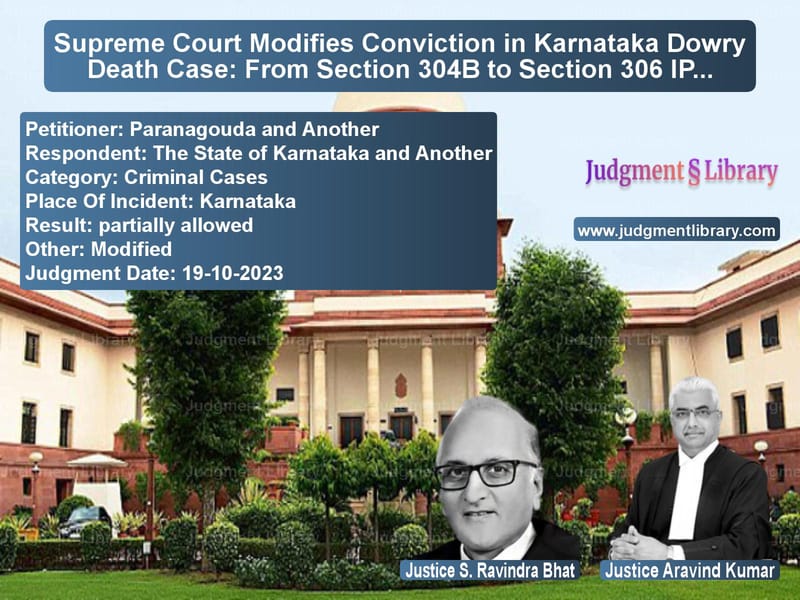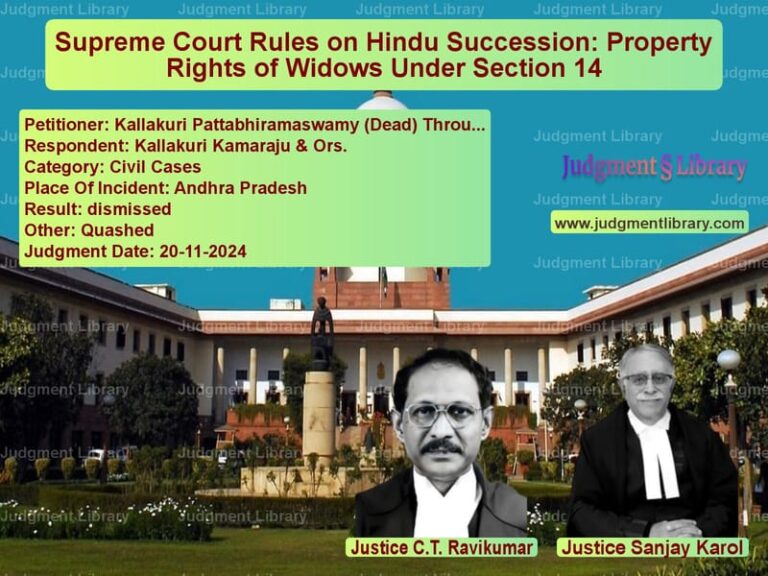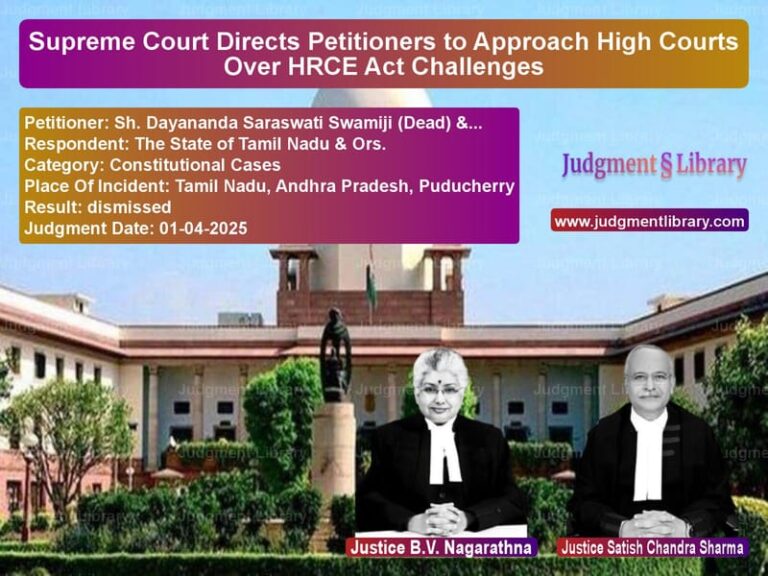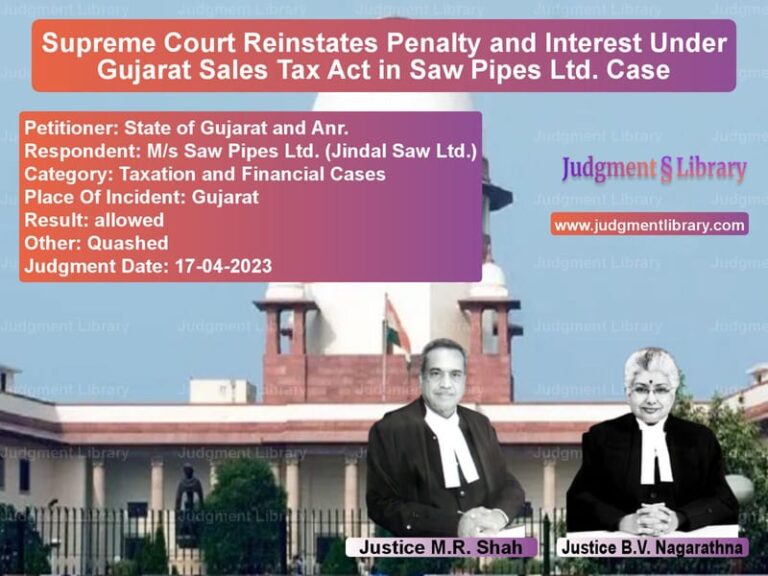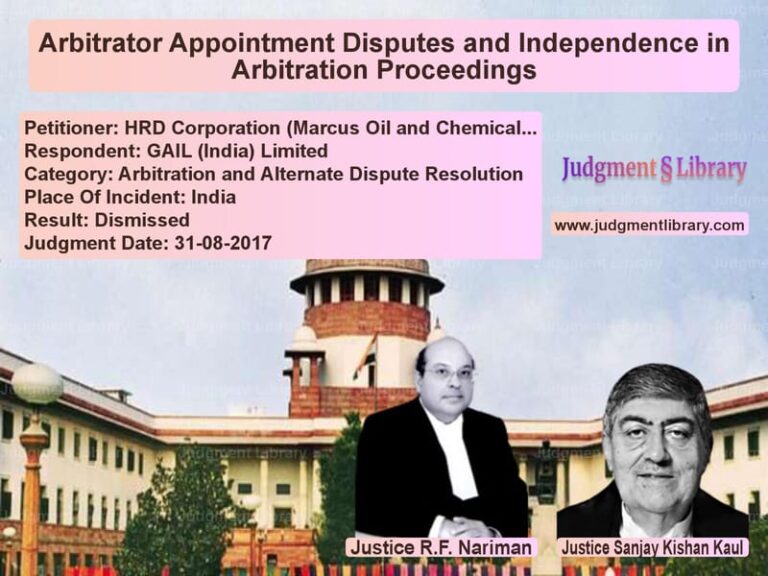Supreme Court Modifies Conviction in Karnataka Dowry Death Case: From Section 304B to Section 306 IPC
The Supreme Court of India recently delivered a crucial judgment in the case of Paranagouda and Another vs. The State of Karnataka, modifying the conviction of the accused in a dowry death case. The court set aside the conviction under Section 304B IPC (Dowry Death) and the Dowry Prohibition Act but convicted the accused under Section 306 IPC (Abetment of Suicide) and Section 498A IPC (Cruelty by Husband or Relatives). This judgment clarifies the legal principles surrounding dowry-related deaths and the evidentiary value of dying declarations.
Background of the Case
The case revolved around the tragic death of Akkamahadevi, who was married to the second respondent (accused No.1) on 16th May 2010. She allegedly committed suicide on 20th December 2010 by self-immolation, reportedly due to dowry-related harassment. Her father, the complainant, alleged that a dowry of ₹31,000 and 1.5 tolas of gold was given at the time of marriage, but later, additional demands of ₹50,000 and more gold were made.
On the day of the incident, a dying declaration was recorded, and she succumbed to burn injuries on 24th December 2010. Initially, an FIR was registered for offenses under Sections 323, 498A, 504 IPC and Sections 3 and 4 of the Dowry Prohibition Act. After her death, Section 304B IPC was added.
Trial Court Verdict
The trial court convicted the accused (husband and in-laws) under the following sections:
- Section 304B IPC – 7 years of simple imprisonment
- Section 3 Dowry Prohibition Act – 5 years of simple imprisonment
- Section 498A IPC – 1 year of simple imprisonment
- Section 4 Dowry Prohibition Act – 1 year of simple imprisonment
- Additional fines were imposed, and all sentences were to run concurrently.
High Court’s Decision
The accused challenged the trial court’s verdict before the Karnataka High Court, arguing that:
- The deceased had suffered 70-80% burn injuries and was not in a condition to make a dying declaration.
- The medical officer did not record her blood pressure or pulse rate.
- Several key prosecution witnesses, including the deceased’s parents, turned hostile.
The High Court, however, upheld the trial court’s verdict, relying primarily on the dying declaration.
Arguments Before the Supreme Court
Arguments by the Accused:
- The dying declaration was unreliable as the victim was physically incapable of making a statement.
- The deceased’s father (PW-24) and other key witnesses did not support the prosecution’s case.
- There was no clear evidence of cruelty or harassment soon before her death, a key requirement for Section 304B IPC.
Arguments by the Prosecution:
- The doctor (PW-31) testified that the deceased was conscious and able to speak when the dying declaration was recorded.
- The dying declaration was recorded by the Tahsildar (PW-25) in the presence of a doctor.
- The cause of death was established as suicide due to sustained harassment.
Supreme Court’s Findings
The Supreme Court examined two key issues:
- Whether the dying declaration was admissible
- Whether the conviction under Section 304B IPC was justified
On the Dying Declaration:
- The court ruled that a dying declaration can be the sole basis for conviction if it is found to be reliable.
- The court referred to the precedent set in Atbir vs. Government (2010), which upheld the validity of dying declarations if they are made voluntarily and without coercion.
- It was noted that the doctor (PW-31) and the Tahsildar (PW-25) confirmed the victim’s mental fitness at the time of recording.
On Conviction Under Section 304B IPC:
The Supreme Court ruled that the essential ingredients for Section 304B IPC were not fully met:
- There was no direct evidence of dowry harassment soon before her death.
- Key witnesses, including the deceased’s parents, turned hostile.
- The causal link between alleged dowry harassment and suicide was not established beyond doubt.
Therefore, the court set aside the Section 304B IPC conviction and the convictions under the Dowry Prohibition Act.
Conviction Under Section 306 IPC (Abetment of Suicide)
The Supreme Court held that the evidence sufficiently proved that the deceased faced consistent harassment, leading to her suicide. The court emphasized:
- There was enough circumstantial evidence to prove cruelty.
- The deceased clearly stated in her dying declaration that she could not bear the harassment anymore.
- Under Section 221 CrPC, if an offense is proven but a different charge was framed, the court can convict the accused under the correct section.
Thus, the court modified the conviction from Section 304B IPC to Section 306 IPC (Abetment of Suicide).
Final Judgment and Sentencing
- The accused were acquitted under Section 304B IPC and Sections 3 and 4 of the Dowry Prohibition Act.
- The accused were convicted under Section 306 IPC and Section 498A IPC.
- The sentence was modified to the period already undergone in jail.
- A fine of ₹5,000 was imposed, and failure to pay would result in one month of simple imprisonment.
Legal Significance of the Judgment
This ruling is a landmark decision clarifying:
- Dowry Death vs. Abetment of Suicide: The court differentiated between Section 304B IPC and Section 306 IPC, emphasizing the need for a direct link between harassment and suicide.
- Value of Dying Declarations: The court upheld the reliability of dying declarations if recorded properly.
- Protection Against False Dowry Claims: The ruling ensures that false or unproven dowry allegations do not automatically lead to convictions under Section 304B IPC.
Conclusion
The Supreme Court’s judgment in Paranagouda and Another vs. The State of Karnataka is a crucial precedent in dowry death cases. By modifying the conviction from Section 304B IPC to Section 306 IPC, the court emphasized the importance of proving a direct link between harassment and death. This case serves as a guiding principle for courts dealing with similar cases, ensuring a fair balance between victim protection and preventing wrongful convictions.
Read also: https://judgmentlibrary.com/criminal-case-dismissed-supreme-court-overturns-section-319-crpc-order/
Petitioner Name: Paranagouda and Another.Respondent Name: The State of Karnataka and Another.Judgment By: Justice S. Ravindra Bhat, Justice Aravind Kumar.Place Of Incident: Karnataka.Judgment Date: 19-10-2023.
Don’t miss out on the full details! Download the complete judgment in PDF format below and gain valuable insights instantly!
Download Judgment: paranagouda-and-anot-vs-the-state-of-karnata-supreme-court-of-india-judgment-dated-19-10-2023.pdf
Directly Download Judgment: Directly download this Judgment
See all petitions in Dowry Cases
See all petitions in Attempt to Murder Cases
See all petitions in Suicide Cases
See all petitions in Judgment by S Ravindra Bhat
See all petitions in Judgment by Aravind Kumar
See all petitions in partially allowed
See all petitions in Modified
See all petitions in supreme court of India judgments October 2023
See all petitions in 2023 judgments
See all posts in Criminal Cases Category
See all allowed petitions in Criminal Cases Category
See all Dismissed petitions in Criminal Cases Category
See all partially allowed petitions in Criminal Cases Category

